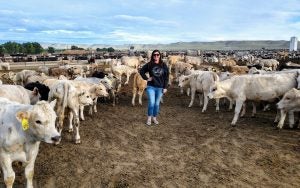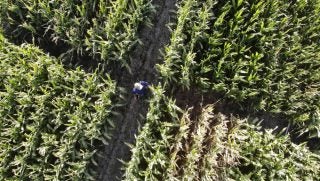We’ve all probably heard the stories. Perhaps you’ve heard that factory farming is a way for big corporations that greedily care only about profits to control animals in awful conditions. The animals are “pumped full” of antibiotics and hormones, or they’re kept in sick and crowded quarters, right? Maybe you’ve heard “big ag” doesn’t care about the environment and soil health and that industrial agriculture is responsible for catastrophes where “industrial” sounds like sad, gray, dreary, and faceless arenas full of machines.
These myths and words or terms cannot be defined. They pull at our heartstrings but don’t hold much in terms of scientific facts, and they affect something all near and dear to us: food. We all want to feel connected to our food in some way, but how many of the emotions we feel hold merit?
I used to buy into all this terminology. I tried to buy from small, local farmers whenever possible and paid extra for labels that I thought would really make a beneficial impact. I still do buy local and am a farmers market vendor in my area, but when it comes to grocery stores, I no longer feel the need to buy the most expensive product as it doesn’t always mean higher quality or better.
So what changed? Well, in my opinion it seems as though people fear what they don’t understand. How many of us have been inside a so-called “factory” farm? How many of us even know a large-scale farmer or have ever worked with butchers or USDA inspectors behind the scenes? I have, throughout my years as a farmer and writer. And let me tell you, what I’ve seen has been absolutely amazing and incredible. It has completely changed my perspective on food. Although our family farm is not that big by comparison, it’s been very interesting to see firsthand how far we’ve come in terms of farm improvements, especially from an environmental perspective on larger-scale farms.

What I was always expecting before large-scale farm tours was the thoughts that these animals would look sad and not well cared, for but boy have I been proven wrong! Over the years I’ve had tours given by folks with Ph.D.s in animal welfare, poultry science, or dairy science to name a few. There are 24/7 camera monitoring on some farms with on-site veterinarians, robotic millers, or data points to track the health of every cow, for example.
Technology has improved every aspect of our lives and food, and farming is no exception. When I think of the term “factory” I think of systems that have been put in place where quality assurance is important. Where teams of people specialize in one arena of expertise to make the best product. A factory is a place with job security that contributes to the economy that depends on research and technology. Farming is a business, and a business cannot grow if it can’t sell a product or it has a product that is low quality.
And what about “industrial” agriculture? Well, whether we want to believe it or not, food is an industrial-scale business, just like iPhones aren’t made in our parents’ basement. It requires hard work, intelligent engineers, and research and development. With less than 2 percent of the population of North America as farmers, it can be easy for us to forget just how big of scale we are talking about here. How much do we take for granted in our first world society? Isn’t it incredible that we have access to fresh produce, coffee, meat and dairy, and processed foods with long shelf life, at our fingertips? Affordable and abundant? How lucky are we that we can have all of that at any time? Could you imagine how angry people would be if the grocery stores ran out of bread, milk, lettuce, etc? COFFEE?!? Lord have mercy.
This article brings up some excellent points on the benefits of industrial agriculture from the perspective of Jayson Lusk, ag economist at Oklahoma State University.
Economies of scale have their advantages, like the ability to afford the latest technologies, equipment, drones, precision ag and data monitoring. They can afford third-party certifications and hire the best employees. Farmers today are able to produce so much more crop with less land and less natural resources. These are all benefits that should be celebrated as we grow to a population of nearly 9 billion people. It’s not to say it will ever be perfect, but check out this article with the data points that should be driven home before judging. Go see it with your own two eyes and learn from the people who do it every day in 2018. You’ll be pleasantly surprised at how far we’ve come and continue to progress.
Michelle Miller, the Farm Babe, is an Iowa-based farmer, public speaker and writer, who lives and works with her boyfriend on their farm which consists of row crops, beef cattle, and sheep. She believes education is key in bridging the gap between farmers and consumers.



